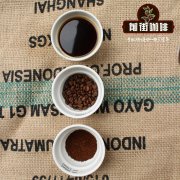Introduction of boutique coffee producing areas in Ethiopia: Bancimaji producing areas in Ethiopia

Professional coffee knowledge exchange more coffee bean information please follow the coffee workshop (Wechat official account cafe_style)
[sunny Ethiopia] from the Banchi Magi producing area (Ethiopia Bench Maji) in Ethiopia, located in the southwest of Ethiopia, it is one of the two major primeval forest coffee (Forest coffee) in China, accounting for about 510% of the output. The coffee trees in the primeval forest are planted in the shade, with sufficient rainfall, fertile soil, and rich ecological environment. Natural shading and intercropping develop a unique aroma of coffee to achieve sustainable environmental and ecological management.
From its initial 14 founding members, 4968 producers (53 per cent of whom are women) have joined the Banchi Magi Xuekou Cooperative (Bench Maji Sheko). Founded in July 2005, it is one of the cooperatives of the Bench Maji Forest Coffee producers and Farmers Cooperatives Union (Bench Maji Forest Farmers Cooperative Union,BMFCU).
In order to improve quality, the BMFCU Alliance mainly selects 15 cooperatives out of 65 members to participate in the Agricultural Development Program (Agricultural Growth Program,AGP) to carry out a series of professional training. Training content package tool technology application, data recording, market sales, organizational governance, finance and finance, etc., in order to build the organization's independent management ability and increase the competitiveness of products in the market. At present, in addition to offices and warehouses, the alliance has also set up a "cup testing laboratory", with professional cup testers to check the quality of each batch.
In 2007, documentary director Adam Overton and photographer wife Rachel Samuel came into contact with the Gera Coffee Forest in the Bench-Maji region of Ethiopia while filming a documentary about Ethiopian coffee for the Ethiopian government. In the process, they were not only reacquainted with the great land of Ethiopia, but also came up with the idea of setting up their own coffee estate and brand.
In 2009, they were lucky enough to meet the famous mule owner, BOP judge Willem Boot, and Willem Boot's idea provided an opportunity for the Overton couple to return to Ethiopia to find the birthplace of Rosa Xia.
Finally they came to Banchi Magi, an area in southwestern Ethiopia near South Sudan, where many places are known as the village of Gesha and where primitive roses are most likely to be found. They decided to build the estate here and name it Gesha Village Coffee Estate.
Later, Willem Boot came to Rosa Manor as their technical adviser, and they found a sample very similar to the native species of Rosa being planted at the mule manor in a primeval forest near the estate known as Gori Gesha.
Bancimaji is located in southwest Ethiopia. The Rosa coffee produced here has a variety of spice flavor and outstanding fruit flavor, which is unique in Ethiopian sun-cured coffee and is worth a try.
This coffee has strong strawberry, cherry fruit flavor, pure taste, light acidity, milk chocolate taste, medium mellow, varied spice flavor and peach wine aroma.
Production area | Banchi Maggie
Altitude | 1900-2100m
Variety | Rosa rugosa native species Gesha Gori
Treatment | Natural for sun treatment
Important Notice :
前街咖啡 FrontStreet Coffee has moved to new addredd:
FrontStreet Coffee Address: 315,Donghua East Road,GuangZhou
Tel:020 38364473
- Prev

Coffee tasting: what is the fragrance of coffee? how to make coffee with floral fragrance?
Professional coffee knowledge exchange more coffee bean information please pay attention to the coffee workshop (Wechat official account cafe_style) high-quality coffee not only contains a strong aroma of flowers and fruit, but also a mixture of sweet and sour. After tasting, the mouth will be clean and comfortable, quickly develop fluid, cheek teeth leave fragrance, intriguing, if compared with Chinese tea, the same work, but more colorful, when you are baking beans
- Next

How do you make Cuban coffee? how do you drink Cuban coffee?
For more information on coffee beans, please follow the Coffee Workshop (Wechat official account cafe_style) Cuba, located in the Caribbean, is a communist island country with Havana as its capital. Cuba is famous not only for its snow-white beaches and cigar tobacco, but also for its excellent coffee. Cuba has a long history of growing coffee, JosA
Related
- Beginners will see the "Coffee pull flower" guide!
- What is the difference between ice blog purified milk and ordinary milk coffee?
- Why is the Philippines the largest producer of crops in Liberia?
- For coffee extraction, should the fine powder be retained?
- How does extracted espresso fill pressed powder? How much strength does it take to press the powder?
- How to make jasmine cold extract coffee? Is the jasmine + latte good?
- Will this little toy really make the coffee taste better? How does Lily Drip affect coffee extraction?
- Will the action of slapping the filter cup also affect coffee extraction?
- What's the difference between powder-to-water ratio and powder-to-liquid ratio?
- What is the Ethiopian local species? What does it have to do with Heirloom native species?

